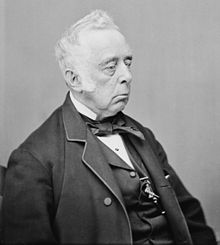Reverdy Johnson
| Reverdy Johnson | |
|---|---|
 |
|
| United States Minister to the United Kingdom | |
|
In office September 14, 1868 – May 13, 1869 |
|
| President |
Andrew Johnson Ulysses S. Grant |
| Preceded by | Charles F. Adams Sr. |
| Succeeded by | John L. Motley |
|
United States Senator from Maryland |
|
|
In office March 4, 1863 – July 10, 1868 |
|
| Preceded by | Anthony Kennedy |
| Succeeded by | William P. Whyte |
| Maryland House of Delegates | |
|
In office 1861–1862 |
|
| United States Attorney General | |
|
In office March 8, 1849 – July 21, 1850 |
|
| President |
Zachary Taylor Millard Fillmore |
| Preceded by | Isaac Toucey |
| Succeeded by | John J. Crittenden |
|
United States Senator from Maryland |
|
|
In office March 4, 1845 – March 7, 1849 |
|
| Preceded by | William D. Merrick |
| Succeeded by | David Stewart |
| Member of the Maryland House of Delegates | |
|
In office 1860-1861 |
|
| Member of the Maryland Senate | |
|
In office 1821-1829 |
|
| Personal details | |
| Born |
May 21, 1796 Annapolis, Maryland, U.S. |
| Died | February 10, 1876 (aged 79) Annapolis, Maryland |
| Resting place | Greenmount Cemetery, Baltimore, Maryland |
| Political party | Whig, Democratic |
| Spouse(s) | Mary Mackall Bowie |
| Children | 15 |
| Parents |
John Johnson (1770–1824) Deborah Johnson (née Ghieselen) |
| Alma mater | St. John's College |
| Profession | Lawyer, Politician |
Reverdy Johnson (May 21, 1796 – February 10, 1876) was a statesman and jurist from Maryland. He defended notables such as Sanford of the Dred Scott case, Maj. Gen. Fitz John Porter at his court-martial, and Mary Surratt, alleged conspirator in the assassination of Abraham Lincoln.
Born in Annapolis, Johnson was the son of a distinguished Maryland lawyer and politician, John Johnson (1770–1824). He graduated from St. John's College in 1812 and then studied law. He was admitted to the bar in 1815, and then moved to Baltimore, where he became a legal colleague of Luther Martin, William Pinkney and Roger B. Taney (Attorney General and later Chief Justice of the United States [1835–1864]). From 1821 until 1825 he served in the Maryland State Senate and then returned to practice law for two decades.
Reverdy Johnson, along with Judge John Glenn and Evan Ellicott were responsible for exacerbating the Baltimore bank crisis of 1835. Mobs of angry depositors attacked and damaged his home facing Battle Monument Square on the northwest corner of North Calvert and East Fayette Streets, just south of the Baltimore City Courthouse (site of the future enlarged Third Courthouse of 1899–1900). Home was previously the site of the first brick house built in Baltimore Town for Edward Fortrell in 1741 and later replaced by the mansion/townhouse built for James Buchanan in 1799, sold to Johnson. Following the collapse of the Union Bank of Maryland, Johnson obstructed efforts to obtain a fair and objective accounting of the bank's assets in order to maintain his personal fortune. He falsely accused Evan Poultney and Thomas Ellicott of misconduct in order to create a smokescreen to obscure his own misconduct.
...
Wikipedia
